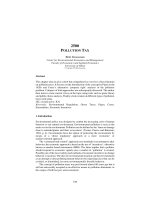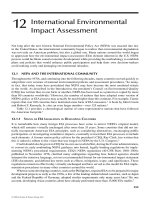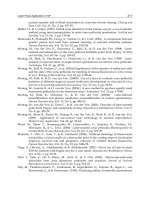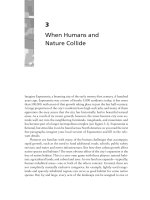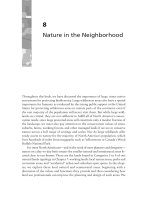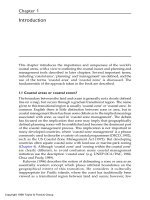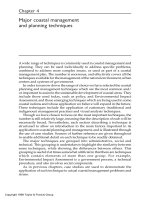Statistics for Environmental Science and Management - Chapter 12 pptx
Bạn đang xem bản rút gọn của tài liệu. Xem và tải ngay bản đầy đủ của tài liệu tại đây (14.24 KB, 1 trang )
CHAPTER 12
Final Remarks
There are a number of books available describing interesting
applications of statistics in environmental science. The book series
Statistics in the Environment is a good starting point because it
contains papers arising from conferences with different themes
covering environmental monitoring, pollution and contamination,
climate change and meteorology, water resources, fisheries and
forestry, radiation, and air quality (Barnett and Turkman, 1993, 1994,
1997). Further examples of applications are also provided by Fletcher
and Manly (1994), Fletcher et al. (1998), and Nychka et al. (1998).
For more details about statistical methods in general, the handbook
edited by Patil and Rao (1994) or the Encyclopedia of Environmetrics
(El-Shaarawi and Piegorsch, 2001) are good general references.
There are several journals that specialize in publishing papers on
applications of statistics in environmental science, with the most
important being Environmetrics, Ecological and Environmental
Statistics, and The Journal of Agricultural, Biological and
Environmental Statistics. In addition, journals on environmental
management frequently contain papers on statistical methods.
It is always risky to attempt to forecast the development of a
subject area. No doubt new statistical methods will continue to be
proposed in all of the areas discussed in this book, but it does seem
that the design and analysis of monitoring schemes, time series
analysis, and spatial data analysis will receive particular attention as
far as research is concerned. In particular, approaches for handling
temporal and spatial variation at the same time are still in the early
stages of development.
One important topic that has not been discussed in this book is the
handling of the massive multivariate data sets that can be produced
by automated recording devices. Often the question is how to reduce
the data set to a smaller (but still very large) set that can be analysed
by standard statistical methods. There are many future challenges for
the statistics profession in learning how to handle the problems
involved (Manly, 2000).
© 2001 by Chapman & Hall/CRC
